Hyundai Bayon vs Skoda Kodiaq – Differences & prices compared
Compare performance, boot space, consumption and price in one view.
Find out now: which car is the better choice for you – Hyundai Bayon or Skoda Kodiaq?
The Hyundai Bayon (SUV) comes with a Petrol engine and Manuel or Automatic transmission. In comparison, the Skoda Kodiaq (SUV) features a Plugin Hybrid, Petrol MHEV, Diesel or Petrol engine with Automatic transmission.
When it comes to boot capacity, the Hyundai Bayon offers 411 L, while the Skoda Kodiaq provides 910 L – depending on how much space you need. If you’re looking for more power, decide whether the 100 HP of the Hyundai Bayon or the 204 HP of the Skoda Kodiaq suits your needs better.
In terms of consumption, the values are 5.40 L per 100 km for the Hyundai Bayon, and 0.40 L for the Skoda Kodiaq.
Price-wise, the Hyundai Bayon starts at 20100 £, while the Skoda Kodiaq is available from 36800 £. Compare all the details and find out which model fits your lifestyle best!
Hyundai Bayon
The Hyundai Bayon is a compact crossover that effortlessly merges practicality with modern design. Its sleek exterior and spacious interior make it an ideal choice for urban settings and longer journeys alike. With a focus on comfort and connectivity, this vehicle provides a smooth driving experience paired with advanced technology features.
details @ hyundai.news
@ hyundai.news
 @ hyundai.news
@ hyundai.news
 @ hyundai.news
@ hyundai.news
 @ hyundai.news
@ hyundai.news
 @ hyundai.news
@ hyundai.news
Skoda Kodiaq
The Škoda Kodiaq impresses with its spacious interior and sleek design, making it a popular choice for families and adventurers alike. Equipped with a range of modern features, it offers a comfortable driving experience and outstanding versatility. Its robust build and refined handling make it suitable for both urban settings and countryside escapades.
details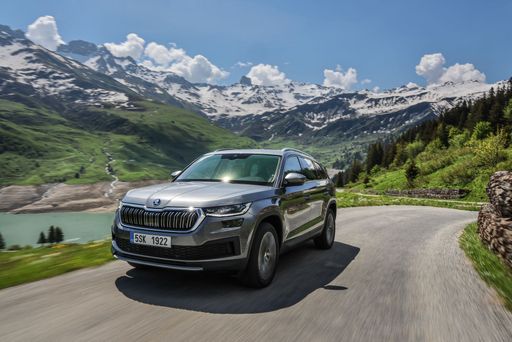 @ skoda-media.de
@ skoda-media.de
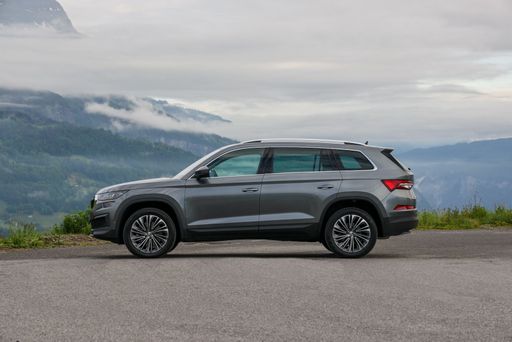 @ skoda-media.de
@ skoda-media.de
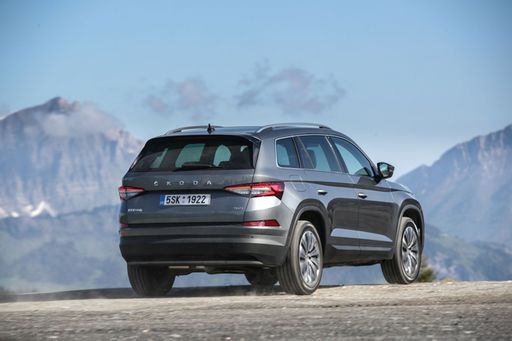 @ skoda-media.de
@ skoda-media.de
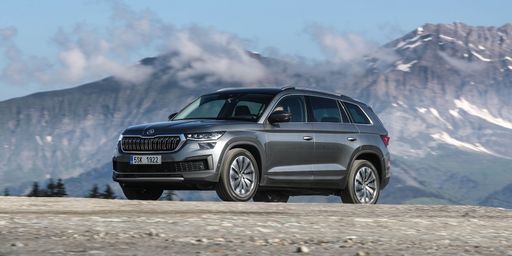 @ skoda-media.de
@ skoda-media.de
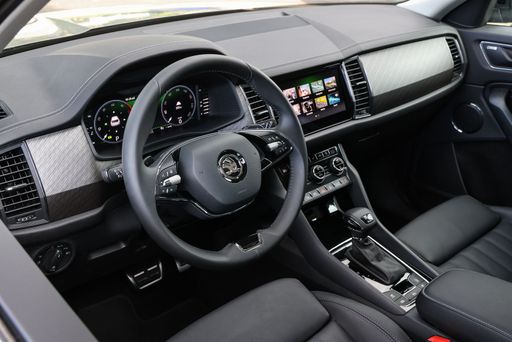 @ skoda-media.de
@ skoda-media.de

|

|
|
|
|
Costs and Consumption |
|
|---|---|
|
Price
20100 - 25800 £
|
Price
36800 - 47300 £
|
|
Consumption L/100km
5.4 - 5.5 L
|
Consumption L/100km
0.4 - 7.6 L
|
|
Consumption kWh/100km
-
|
Consumption kWh/100km
-
|
|
Electric Range
-
|
Electric Range
113 - 123 km
|
|
Battery Capacity
-
|
Battery Capacity
19.70 kWh
|
|
co2
124 g/km
|
co2
9 - 172 g/km
|
|
Fuel tank capacity
40 L
|
Fuel tank capacity
45 - 58 L
|
Dimensions and Body |
|
|---|---|
|
Body Type
SUV
|
Body Type
SUV
|
|
Seats
5
|
Seats
5
|
|
Doors
5
|
Doors
5
|
|
Curb weight
1170 - 1195 kg
|
Curb weight
1661 - 1913 kg
|
|
Trunk capacity
411 L
|
Trunk capacity
745 - 910 L
|
|
Length
4180 mm
|
Length
4758 mm
|
|
Width
1775 mm
|
Width
1864 mm
|
|
Height
1500 mm
|
Height
1679 - 1683 mm
|
|
Payload
460 - 465 kg
|
Payload
497 - 538 kg
|
Engine and Performance |
|
|---|---|
|
Engine Type
Petrol
|
Engine Type
Plugin Hybrid, Petrol MHEV, Diesel, Petrol
|
|
Transmission
Manuel, Automatic
|
Transmission
Automatic
|
|
Transmission Detail
Manual Gearbox, Dual-Clutch Automatic
|
Transmission Detail
Dual-Clutch Automatic
|
|
Drive Type
Front-Wheel Drive
|
Drive Type
Front-Wheel Drive, All-Wheel Drive
|
|
Power HP
100 HP
|
Power HP
150 - 204 HP
|
|
Acceleration 0-100km/h
11.3 - 12.4 s
|
Acceleration 0-100km/h
7.8 - 9.7 s
|
|
Max Speed
176 - 179 km/h
|
Max Speed
205 - 226 km/h
|
|
Torque
172 - 200 Nm
|
Torque
250 - 400 Nm
|
|
Number of Cylinders
3
|
Number of Cylinders
4
|
|
Power kW
74 kW
|
Power kW
110 - 150 kW
|
|
Engine capacity
998 cm3
|
Engine capacity
1498 - 1984 cm3
|
General |
|
|---|---|
|
Model Year
2024
|
Model Year
2024
|
|
CO2 Efficiency Class
D
|
CO2 Efficiency Class
B, E, F
|
|
Brand
Hyundai
|
Brand
Skoda
|
Hyundai Bayon
Introducing the Hyundai Bayon: A New Era in Compact SUVs
The Hyundai Bayon, a compact SUV designed with urban adventurers in mind, is making waves with its exceptional blend of style, performance, and technology. The brand has pulled out all the stops to ensure that the Bayon stands out in the crowded SUV market, offering a vehicle that is both practical and innovative.
Sleek Design and Cutting-Edge Aerodynamics
The Bayon features a striking exterior design, characterised by its bold lines and angular shapes. With a length of 4180 mm, a width of 1775 mm, and a height of 1500 mm, the Bayon commands attention with its modern appeal and aerodynamic efficiency. These dimensions not only contribute to its sleek design but also enhance fuel efficiency, achieving an impressive 5.4 L/100 km.
Engine Performance and Specifications
Under the bonnet, the Bayon is powered by a 1.0-litre T-GDI petrol engine, delivering a robust 100 PS or 74 kW. This engine is available with either a manual or automatic gearbox, meeting varied driver preferences. The front-wheel-drive system complements its urban-centric design, ensuring a smooth and responsive ride.
Maximised Interior Space and Comfort
The spacious interior of the Bayon accommodates up to five passengers comfortably. The vehicle boasts a boot space of 411 litres, perfect for both everyday use and weekend getaways. The cabin is designed with practicality and technology in mind, with intuitive controls and ample storage options.
Advanced Technology and Connectivity
Hyundai has equipped the Bayon with state-of-the-art technology to enhance the driving experience. The SUV features a high-resolution touchscreen, offering seamless connectivity with Apple CarPlay and Android Auto. Safety is also a priority, with multiple driver assistance systems including lane-keeping assist and forward collision avoidance assist.
Environmental Efficiency
Despite its powerful performance, the Bayon achieves a respectable CO2 efficiency class of D, with emissions as low as 122 g/km. This balance between performance and environmental responsibility makes the Bayon an attractive option for conscientious drivers.
Affordability and Market Appeal
The Hyundai Bayon is competitively priced, ranging from €22,900 to €29,600. Its affordable running costs, estimated at 32.3 to 36.4 cents per kilometre, further enhance its appeal to budget-conscious consumers. With monthly costs ranging from €806 to €909, the Bayon provides excellent value without compromising on features or performance.
Final Thoughts
The Hyundai Bayon truly stands out in the compact SUV segment, combining style, innovation, and practicality in an appealing package. It offers a versatile driving experience suited to the demands of modern urban living, making it a top contender in its class. As Hyundai continues to champion forward-thinking design and technology, the Bayon is a testament to the company's ongoing commitment to excellence.
Skoda Kodiaq
The Skoda Kodiaq: An SUV at the Cutting Edge of Technology
The Skoda Kodiaq, a strikingly designed SUV, continues to impress with its blend of power, efficiency, and innovation. This popular model from Skoda combines advanced engineering with modern comforts, making it a favourite for families and adventurers alike. In this article, we'll delve into the technical details and innovations that make the Skoda Kodiaq a standout in the auto industry.
Powerful Performance Options
The Skoda Kodiaq offers a range of engine options to suit different driving preferences. From the efficient PlugIn-Hybrid models with up to 204 PS to the robust Diesel engines with up to 193 PS, drivers can choose the balance of power and efficiency that suits them. The performance is managed by an automatic transmission system, ensuring a smooth and responsive ride.
Innovation in Hybrid Technology
Skoda has taken significant strides in integrating hybrid technology into the Kodiaq. The PlugIn-Hybrid models boast an impressive electric range of up to 123 km, a testament to their efficient powertrain technology. Mild-Hybrid options are also available, offering a clever blend of petrol power with electrical assistance to reduce fuel consumption and emissions.
Comfortable and Spacious Interior
The Kodiaq's interior is designed with both luxury and practicality in mind. It offers ample space, with a boot capacity ranging from 745 to 910 litres, making it ideal for long journeys or family holidays. The vehicle's interior dimensions, complemented by a variety of high-tech features, ensure comfort and convenience for all passengers.
Advanced Safety Features
Safety is a top priority in the Skoda Kodiaq, with features such as advanced driver assistance systems, multiple airbags, and comprehensive stability controls. These technologies work together to provide drivers and passengers with peace of mind, whether on city streets or long motorway drives.
Impressive Fuel Efficiency
With fuel consumption rates as low as 0.4 L/100 km for hybrid versions, the Kodiaq sets high standards in terms of efficiency. Its Diesel counterparts also deliver competitive fuel economy. These efficient performances not only benefit your pocket but also contribute to reducing your carbon footprint.
Conclusion: A Blend of Efficiency and Power
In conclusion, the Skoda Kodiaq stands out with its combination of power, efficiency, and innovative technologies. With a variety of configurations to choose from, it is a vehicle that caters to diverse needs while ensuring an engaging driving experience. Whether it's the robust Diesel engines or the eco-friendly hybrid models, the Kodiaq continues to lead the way in the SUV segment.
The prices and data displayed are estimates based on German list prices and may vary by country. This information is not legally binding.
